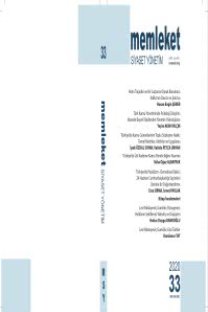SÜRDÜRÜLEBİLİR ÜRETİM-TÜKETİM POLİTİKALARI ÇERÇEVESİNDE "YEŞİL EKONOMİ" ÜZERİNE BİR DEĞERLENDİRME
AN ASSESSMENT on the SUBJECT of "GREEN ECONOMY" AS PART of SUSTAINABLE PRODUCTION-CONSUMPTION POLITICS
___
- Aldemir, Şenkan, Kaypak, Şafak, "Eko-Ekonomi Kavramı ve Türkiye İçin Değerlendirmeler", 2. Ulusal İktisat Kongresi, Dokuz Eylül Üniversitesi İktisadi ve İdari Bilimler Fakültesi, İzmir, s. 1.
- Aşıcı, Ahmet, Şahin, Ümit, Yeşil Ekonomi, Yeni İnsan Yayınevi, Yeşil Politika Serisi: 2, 2012, s. 10-53.
- Avrupa Çevre Ajansı, Avrupa "da Çevre: 2010 Durum ve Genel Görünüm, Avrupa Birliği Resmi Yayınlar Ofisi, Copenhagen, 2010, s. 127.
- Barlas, Nükhet, Küresel Krizlerden Sürdürülebilir Topluma, Boğaziçi Üniversitesi Yayınevi, 2013, İstanbul, 5. 225-250.
- Commision of DG Environment, "Action Plan For Sustainable Consumption, Production and Industry", MEMO/08/507, Brussels, 2008, s. 5-6.
- Çepel, Necmettin, Çevre Koruma ve Ekoloji Terimleri Sözlüğü, TEMA Yayınları, İstanbul, 1996, s. 65.
- Daly, Herman E., Beyond Growth: The Economics of Sustainable Development, Beacon Press., 1997, s. 52.
- Derek, Wall, Yeşil Politika, (Çev.: İlknur Urkun Kelso),Yeni İnsan Yayınevi, İstanbul, 2013, s. 47-87.
- Duygu, Ergin, Çevre El Broşürü, Çankaya Belediyesi, Ankara, 2007, s. 212.
- European Communities, "Sustainable Production and Consumption in the European Union", Brussel, 2004, http://ec.europa.eu/environment/eussd/escp_en.htm, (Erisim Tarihi: 20.05.2015)
- European Commission, Commission Staff Working Document of Regional Policy Contributing to Sustainable Growth in Europa 2020, SEC (2011) 92 Final Report Brussels, 2011, s. 7-9.
- European Commissions, Life Cycle Indicators For Resources Products and WasteJoint Research Centre Technical Reports, Luxembourg, 2008, s. 6-8.
- Europe Environment Agency, "Towards Green Economy in Europe: 2011 Eionet Workshop on Green Economy with Focus on SCP", Danimarka, 2011, s. 4.
- Europe Environment Agency, "Waste Prevention and End-of--Life Waste Management Policies are Covered in the EEA-ETC Series of Waste Policy Factsheet", Work Plan, 2009, s. 3-5.
- European Environment Agency, Cevre ve Şehircilik Bakanlığı, "Ekosistem Hizmetlerinin Değerlendirmesi Çalıştayı: Türkiye Balkanlar ve Kafkasya", Antalya, Anonim, 2012.
- Europan Environment Agency (EEA), Annual Management Plan, Copenhagen, 2012, s. 25-27.
- Global Footprint Network, Carriying Capacity and Ecological Footprints, 2012, http://www.overpopulation.org/solutions.html#Carrying Capacity, 5. 5.
- Heather, Sander, Polasky, Stephen G.Haight Robert "The Value of Urban Tree Cover: Hedonic Property Price Model In Ramsey and Dakota Countries", USA, 2010, s. 1646-1653.
- International Insitute For Sustainable Development (IISD), "Instruments For Change Definitions and Concepts: Sustainable Consumption Symposium, 5. 1-5. http://WWW.iisd.org/susprod/principles.htm, (Erişim Tarihi: 12.06.2014).
- Karacan, A.Rıza, Çevre Ekonomisi ve Politikası, Ege Üniversitesi Yayınları, Yayın No: 6, İzmir, 2013, s. 623-624.
- Kasuhik, Anubha, Perspectives in Environmental Studies, New Age Publishers, New Delhi, 2004, s. 65.
- Kislalioglu, Mine, Berkes, Fikret, Ekoloji ve Çevre Bilimleri, Remzi Kitabevi, İstanbul, 2003, s. 26.
- Maziotta, Matteo, Pareto A., "A Well Being Index Well-Being Index Based on the Weighted Product Method", 2012, 5.2.
- Max, Fordham, "Sustainability Matrix-Wider Paramaters", http://www.maXfordham.com/news/publications/sustainability-matrix-refurbishedoffices, (Erişim Tarihi: 31.08.2015)
- Mutlu, Ahmet, "Sürdürülebilir Kalkınma ve Çevre Muhasebesi (I)", Muhasebe ve Finansman Dergisi, 33/1, 2007, s. 178-187.
- Stephan Moll, Watson David, "Environmental Pressures From European Consumption and Production", European Topic Centre on Sustainable Production and Consumption, European Environment Agency, Copenhagen, 2009, s. 4-7.
- Research Development and Consulting, Evaluation of Costs and Benefits For The Achievement of Reuse And Recycling Targets For The Different Packaging Materials in The Frame of The packaging And Packaging Waste Directive, 94/62/EC, 2003, s. 5.
- Reyhan, Hakan, Ekolojik Emperyalizm Gıdaya Tahakkümün Biyopolitigi, Alter Yayıncılık, Ankara, 2012, s. 69.
- Satır, Ayşen, "Sürdürülebilir Tüketim ve Üretim (STÜ)", Çevre ve İnsan Dergisi, Sayı: 76, 2009/1, s. 34.
- Sektörel Dernekler Federasyonu (Federation of lndustrialAssociations), "AB Katı- lım Sürecinde Türkiye İçin Sürdürülebilir Üretim ve Tüketim", 8.Rekabet Kongresi, İstanbul, Anonim, 2012.
- Şahin, Ümit, Yeşil Düşünceden Yeşil Ekonomiye (Çev.: İnan Mayıs Aru), Yeni İnsan Yayınevi, İstanbul, 2012, s. 10-25.
- Tanuro, Daniel, Yeşil Kapitalizm İmkansızdir (Çev.: Yalçın Toklu), TMMOB Elektrik Mühendisleri Odası Yayınları, İstanbul, 2011, s. 61.
- UNEP, Ilo, Ituc, Ioe, "Green Jobs: Towards Decent Work in Sustainable: LowCarbon World", United Nations Environment Programme, 2014, s. 3.
- UNEP, "The Transition to Green Economy: Benefits, Challenges And Risks From Sustainable Development Perspective", United Nations Environment Programme UN Conference on Trade and Development, 2011, s. 7-8.
- United Nations Environment Programme (UNEP), "Towards Green Economy", Nairobi, 2011, s. 3-4.
- WWEA (Dünya Rüzgâr Enerjisi Birliği), Dünya Rüzgâr Enerjisi Raporu, 2010, s. 32.
- Yale Center For Environmental Law and Policy, "2005 Environmental Sustainability Index", Minesota, USA, 2005, s. 19.
- ISSN: 1306-8202
- Yayın Aralığı: 2
- Başlangıç: 2006
- Yayıncı: Yerel Yönetim Araştırma Yardım ve Eğitim Derneği (YAYED)
DÜNYANIN DÜZELTİLMESİ ÜZERİNE BİR ARAŞTIRMA: GENETİZM VE İNSAN HAKLARI
BİLİMSEL GELİŞMENİN TEMELİNDEKİ DOĞU-BATI ETKİLEŞİMİ
1980 ÖNCESİ ÜLKÜCÜ HAREKETİN İSLAMİLEŞMESİNDE SEYİT AHMET ARVASİ ETKİSİ VE “TÜRK-İSLAM ÜLKÜSÜ”
DEVLET VE DİN İLİŞKİLERİ BAĞLAMINDA DEVLETİN DİN ÜZERİNDEN NEO-LİBERAL DÖNÜŞÜMÜ
SÜRDÜRÜLEBİLİR ÜRETİM-TÜKETİM POLİTİKALARI ÇERÇEVESİNDE "YEŞİL EKONOMİ" ÜZERİNE BİR DEĞERLENDİRME
